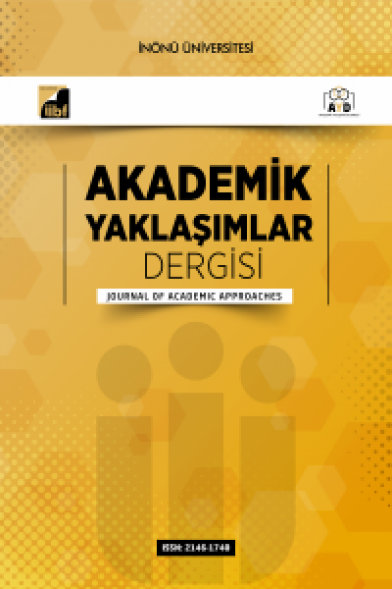The Contribution of Tourism to Economic Growth: A Research on the Turkey
Öz
Having the second biggest share in total exports after manufacturing industry, tourism receipts of Turkey, refers to the importance of tourism as an export-led growth strategy. This study aims to determine the relationship between tourism receipts and long-term economic growth for Turkey. To this end, the variables specified in the model are determined as Gross Domestic Product, Tourism Receipts and Real Exchange Rate. In the study covered the period 1972-2014 using annual data, Johansen co-integration test was performed to determine the long-term relations. As a result two co-integration vectors have been found, meaning that tourism incomes have had a positive effect on Turkey’s economic growth. The results of the study show that 1% increase in tourism receipts leads to economic growth by 0.314%. Granger causality test results also verify that the existence of cointegration relationship. Based on this evidence, it may be stated that tourism directly affects Turkey's economic growth.
Anahtar Kelimeler:
Tourism Receipts, Economic Growth, Time Series Analysis, Turkey
___
- AKAMA, John; Kieti, DAMIANNAH. (2007), “Tourism and Socio-economic Development in Developing Countries: A Case of Mombasa Resort in Kenya”, Journal of Sustainable Tuorism, Vol. 15, No. 6, ss. 735-748.
- AKÇA, Emrah Eray. (2015), Doğal Kaynakların Ekonomik Gelişme Üzerine Etkisi: Seçilmiş Ülke Deneyimleri, İktisadi Araştırmalar Vakfı İktisadi İşletmesi Yayınları, İstanbul.
- AKTAŞ, Cengiz (2005), “Türkiye’nin Turizm Gelirlerini Etkileyen Değişkenler İçin En Uygun Regresyon Denkleminin Belirlenmesi”, Doğuş Üniversitesi Dergisi, 6(2), ss. 163-174.
- AKTOB (2014), “2023’e Doğru Türkiye’de Turizmin 100 Yılı-Turizm Sektörünün Yapısı, Büyüklüğü ve Ekonomiye Katkısı”, http://www.aktob.org.tr/pdf/arastirma2014.pdf, Erişim Tarihi: 10.09.2015.
- ASTERIO, Dimitrios; HALL, Stephen G. (2011). Applied Econometrics. Palgrave Macmillan, Second Edition.
- AUTY, Richard M. (1994), “Industrial policy reform in six large newly industrializing countries: The Resource Curse Thesis”, World Development, Vol. 22, Sayı 1, ss. 11-26.
- BAHAR, Ozan (2006), “Turizm Sektörünün Türkiye’nin Ekonomik Büyümesi Üzerindeki Etkisi: VAR Analizi Yaklaşımı”, Yönetim ve Ekonomi, Cilt 13, Sayı 2, ss. 137-150.
- BAHAR, Ozan; BOZKURT, Kurtulmuş (2010), “Gelişmekte Olan Ülkelerde Turizm-Ekonomik Büyüme İlişkisi: Dinamik Panel Veri Analizi”, Anatolia: Turizm Araştırmaları Dergisi, Cilt 21, Sayı 2, ss. 255-265.
- BALAGUER, Jacint; CANTAVELLA-JORDA Manuel (2002), “Tourism As a Long-run Economic Growth Factor: The Spanish Case”, Applied Economics, 34:7, ss. 877-884.
- BRAU, Rinaldo; LANZA, Alessandro; PIGLIARU, Francesco (2007), “How fast are small tourism countries growing? Evidence from the data for 1980-2003”, Tourism Economics, Vol 13, No 4, ss. 603-614.
- Yayın Aralığı: Yılda 2 Sayı
- Başlangıç: 2010
- Yayıncı: Gökhan Tuncel
Sayıdaki Diğer Makaleler
Türkiye’de Turizm Sektörünün İstihdama Katkısı
Türkiye’de Çocuğa Yönelik Sosyal Politika Uygulamaları ve Tarihsel Analizi
Yasemin MAMUR IŞIKÇI, Selma KARATEPE
Timur KESKİNTÜRK, Emin UZ, Mehmet TOPAL
Gelir Dağılımının Asgari Ücretler ve Çalişma Saatleri Açısından Değerlendirilmesi
Kürşad HACITAHİROGLU, Elvin AYDOĞAN
Seyfettin ASLAN, Yılmaz DEMİRHAN, Muhyettin ERTAŞ
Türkiye'de Kamu Yöneticilerinin Yetiştirilmesi, Sorunlar ve Çözüm Önerileri
Orta Çağ İktisat Tarihinde Tefecilik Yasağından Kurtuluş
Türkiye’de Tarımsal Turizmin Gelişme Potansiyeli: Yeşilköy Örneği AB İle Karşılaştırmalı Bir Analiz
The Contribution of Tourism to Economic Growth: A Research on the Turkey
